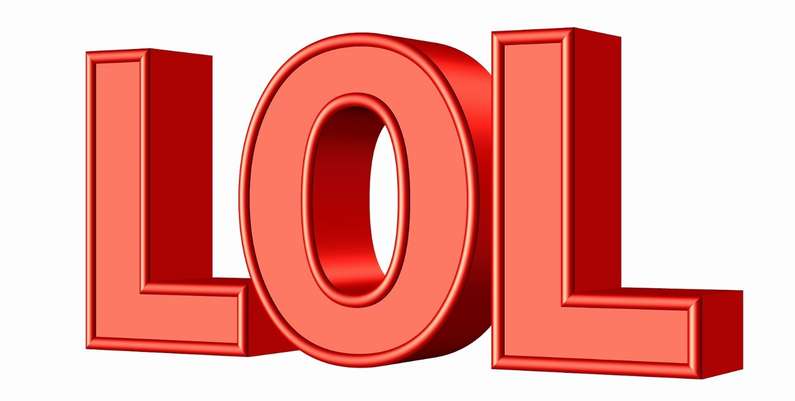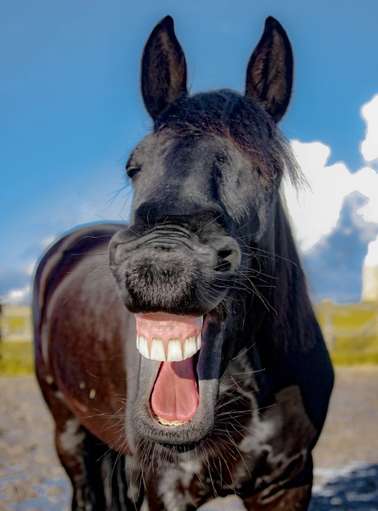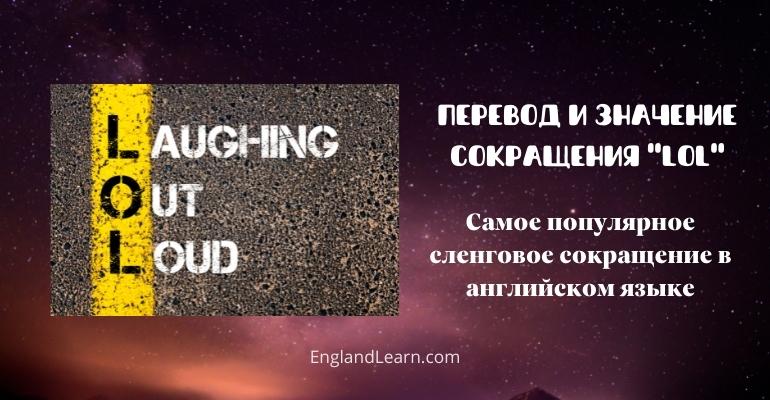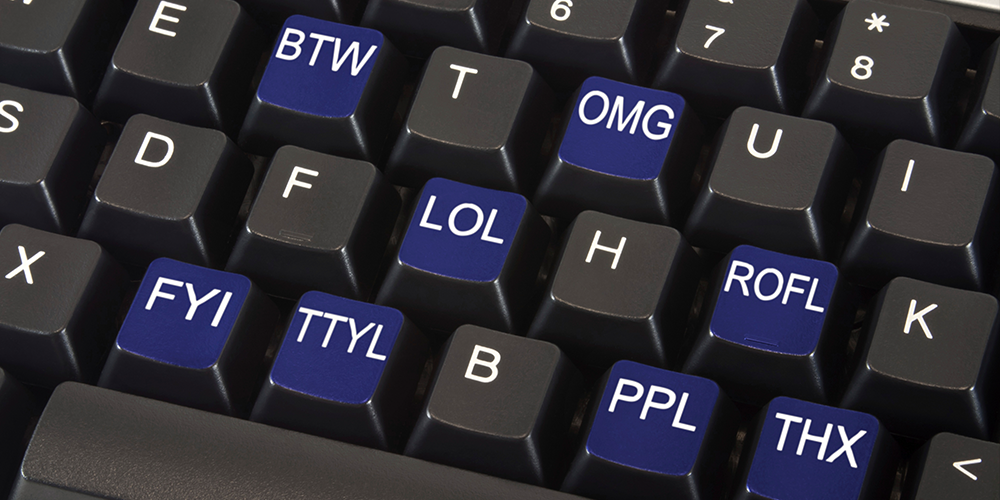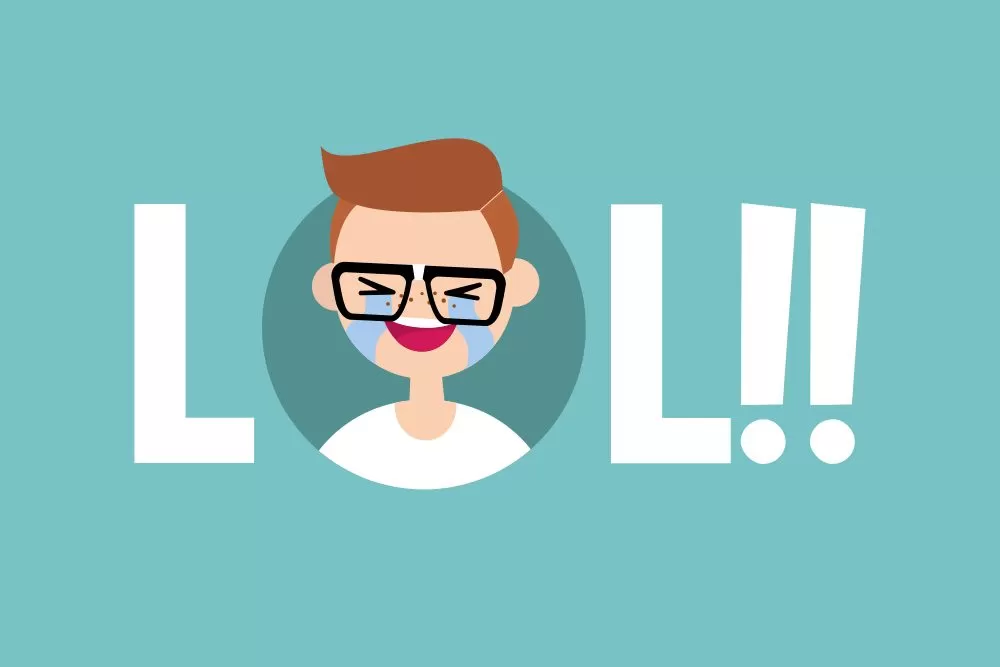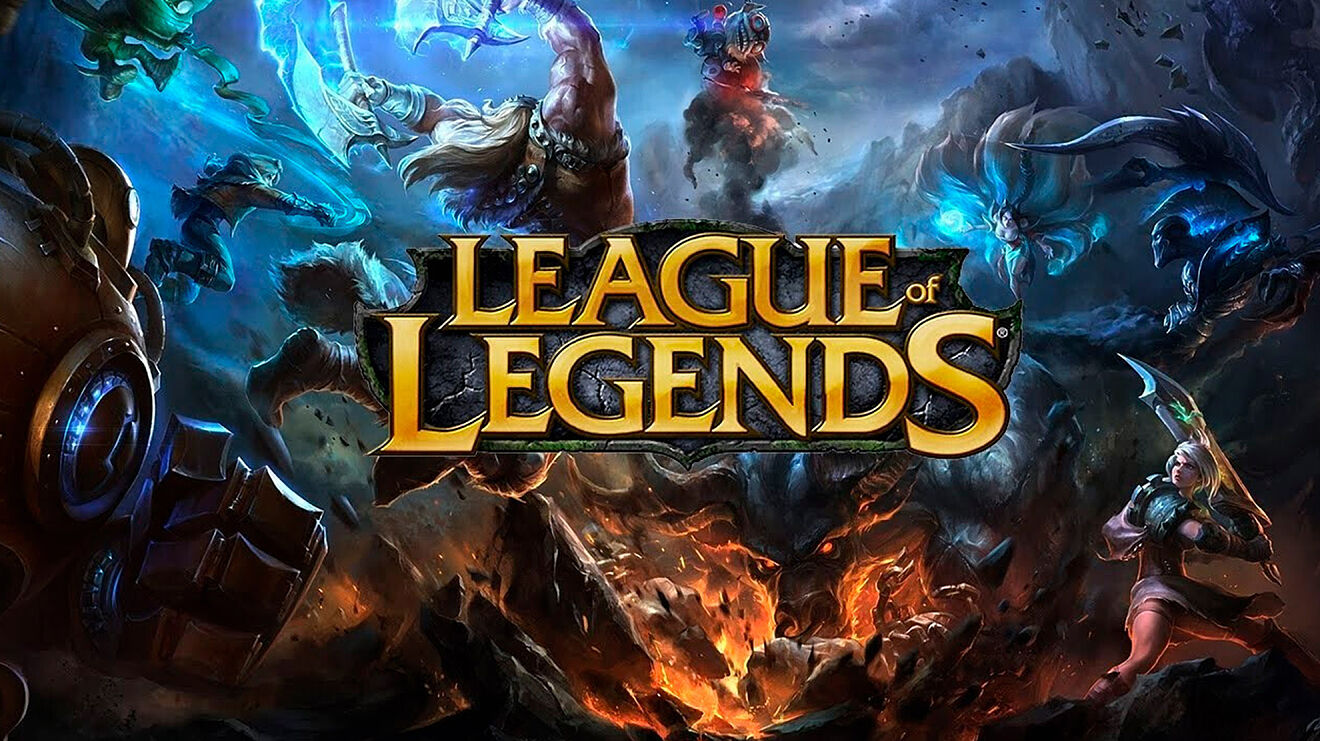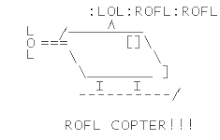Довольно часто в интернете на форумах, чатах и в комментариях на молодежных развлекательных сайтах можно столкнуться со словом ЛОЛ. Многие молодые люди и в повседневной жизни употребляют данное слово, но при этом не задумываются о значении этого слова.
Эта аббревиатура пришла к нам из американского сленга. Дело в том, что когда появились мобильные телефоны, в смс сообщениях был установлен лимит символов и люди начали сокращать слова. Постепенно эти сокращения перешли в разговорную речь, а далее и в интернет.
Аббревиатура, состоящая из английских слов Laughing Out Loud, что переводится, как громко смеяться. И употребляется, когда есть необходимость выражения чувства смеха при переписки. Т.е. данной аббревиатурой выражают чувство громкого смеха, когда прочитали что-то смешное или в смс-сообщении прислали смешной анекдот, вы ответили на него и показали словом LOL, что анекдот действительно смешной.
В настоящее время среди учеников младших классов можно услышать слово ЛОЛ, но не в том смысле, которое слово означает на самом деле. Дети-школьники чаще произносят его, когда хотят какого-нибудь оскорбить в смысле глупый или тупой. Но кто так думает, тот ошибается.
Акроним получил распространение относительно недавно. В 2003 году группой студентов было проведено исследование, согласно которому использование интернет-сленга в сетевом общении, в особенности в мгновенном обмене сообщениями, оказалось ниже ожидаемого. В рамках исследования было анализировано 2185 сообщений, содержащих в общей сложности 11 718 слов. Акронимы были использованы лишь 90 раз, из которых 76 были LOL (0,6 % от общего числа слов). Согласно другому исследованию, проведённому в 2008 году, процент использования интернет-сленга, в том числе акронима LOL, составлял уже 2,4 %. В марте 2011 года LOL наряду с OMG и символом <3 был занесён в Оксфордский словарь.
Акроним LOL (акроним-это аббревиатура образованная начальными буквами слов). И как на многих сайтах написано, что синонимы к слову «лол» это чайник, нуб, неудачник, то это опять не правда. Синонимы этого слова, имеющие похожее лексическое значение. Например: храбрый-смелый. Вот и сделайте вывод, какой синоним подходит к акрониму LOL? И последнее, что хочется отметить, не употребляйте данное слово, как ругательское, ведь слово ЛОЛ означает громко смеяться. Не будьте безграмотным!
Именно этот смысл и закладывался в него изначально — смешно до коликов, смеюсь вслух, громко хохочу, падаю со стула (еще более убойный ржач обозначают словом рофл, но это уже другая статья). Образована эта аббревиатура от соответствующей фразы на английском языке по одной версии от «Lots of Laughs». В любом случае сокращенно получается LOL. Иногда увеличивают количество букв O в слове, тем самым подчеркивая экспрессию.
Наши с вами соотечественники уловили сходство написания lol и русской буквы Ы, поэтому можно встретить и такую интерпретацию написания данной фразы. Есть и еще близкий вариант lulz, который обозначает прикол или хохму. Есть еще вариация ОЛОЛО — выражает иронию или сарказм (что это такое?). В общем, даже жаргонизмы обрастают различными вариантами написания и использования.
Правильно же писать это слово LOL (ЛОЛ), т.е. все буквы в нем должны быть заглавными , как и в любой другой аббревиатуре. Но это правило соблюдается далеко не всегда, да и сам смысл этого слова, которое по сути должно лишь значить смех, вызванный сообщение пользователя (выражение эмоции, либо одобрение шутки, комплимента в адрес шутки оппонента).
Но, как вы понимаете, смех может восприниматься по разному. Некоторые на него обижаются. В особенности это касается людей недалеких или же страдающих комплексами. Также на смех очень часто неадекватно реагируют подростки (школота, если выражаться интернет-жаргонизмами).
Представьте ситуацию, когда такой человек что-то «сморозил» в топике на форуме, чате или блоге, а в ответе на его сообщение он увидел LOL. Толком не понимая его значение он принимает смех за оскорбление и когда таких случаев накапливается много, то и значение этого слова несколько видоизменятся.
Из иллюстратора самой положительной человеческой эмоции (искреннего смеха) ЛОЛ переходит в разряд оскорблений. В некоторых сообществах (в основном, где преобладает «комплексующая школота») под ЛОЛом понимают глупого и недалекого человека (тупящего или простоватого). Еще более уничижительным в такой компании считается «ЛОЛО», но это уже плод чьей-то больной фантазии (производное от LOL, опять же).
В общем, если хотите при общении в интернете выразить эмоцию смеха, а возможности вставить подходящий смайлик нет (хотя, ведь всегда можно попробовать использовать двоеточие и закрывающую круглую скобку «:)»), то смело ставьте ЛОЛ. Если рассматривать правила пунктуации, то эта аббревиатура должна рассматривать как междометие (выражается эмоция) и выделяться с обеих сторон запятыми.
Ну и, естественно, что не стоит уподобляться «школоте» и опускаться до уровня быдлофорумов, используя это слово в качестве оскорбления. Это смех, да и только…
Есть мнение что ЛОЛом, больше не пользуются и совсем про него позабыли.
«Фейсбук» провел исследования применения сокращений и смайликов и оказалось, что про «ЛОЛ» все давно забыли. Как оказалось, пользователям соцсети больше по душе эмоджи, они же смайлы, и фразы типа «haha» или «hehe». Чтобы оценить юмор или посмеяться LOL теперь пишут лишь 1,9% юзеров. При этом «haha» (наш вариант — «хаха») — использует более 51% любителей позависать в «Фейсбуке». Что примечательно, есть и гендерные различия. Большинство мужчин используют «haha», а вот женщины предпочитают выражать смех посредством «hehe». Также на использовании LOL сказывается возраст. Пользователи старше 28 лет используют его все еще довольно часто, а вот юзеры помладше предпочитают смайлики.
[источники]
Источники:
Источник:
chtooznachaet.ru/slovo_lol.html
ru.wikipedia.org/wiki/LOL
ktonanovenkogo.ru/voprosy-i-otvety/chto-takoe-lol-lol.html
kp.ua/life/508678-v-sotssetiakh-slovo-LOL-bolshe-ne-modnoe
Это копия статьи, находящейся по адресу http://masterokblog.ru/?p=35920.
Сокращение LOL (laughing out loud, громко смеюсь вслух) стало популярным в конце 90-х. И вот оказывается, что это слово доживает последние деньки — по результатам исследования Facebook, уже в 2015 году LOL использовали только около 2% пользователей старше 30. Разбираемся, чем его можно заменить.
Эти два варианта пришли на смену LOL в переписке, еще к ним часто добавляют смеющийся смайлик. Носители даже придумали такую неформальную градацию употребления haha и hehe:
Ha — ты меня очень разозлил
Ha! — у тебя получилось задеть меня за живое
Hah — так себе шутка *зевает*
Haha — не очень смешно, но ты хотя бы попытался, и я это уважаю
Hahaha — шутка удалась
Nyahahahaha — смеюсь, как милая японская кошечка, лама или Питер Гриффин
HAHAHAHAHAHAHA — что ты наделал, я никогда не перестану смеяться
Heh — я никогда не веселился в своей жизни и не планирую
Heh heh — я собираюсь завоевать этот мир
Muahahaha — я собираюсь завоевать этот мир и уже выдвигаюсь
Hehe — я попытался показать, что мне смешно (получилось?)
Эта фраза подойдет и для разговора, и для переписки. «I’m dead» используют, чтобы выразить усталость или беспокойство, если вы напортачили на работе и босс об этом сейчас узнает. Ну или если вам очень-очень смешно.
I’m watching cat memes, and I’m just dead! Check them out.
Я смотрю мемы с котиками и умираю со смеха! Зацени их.
Чтобы оставаться в теме и говорить на актуальном английском, пройдите наш бесплатный интенсив по сленгу. 14 дней — 14 крутых подборок.
Запишитесь на бесплатный интенсив по английскому сленгу
Скоро на имейл вам придет письмо с инструкцией. А пока запишитесь на бесплатное онлайн-занятие с преподавателем и получите в подарок еще 2 урока.
Скоро на имейл вам придет письмо с инструкцией. А в течение часа мы позвоним и подберем удобное время занятия. Продуктивного дня 🙂
Ой, произошла ошибка обработки. Попробуйте еще раз чуть позднее.
Ой, произошла ошибка обработки. Скорее всего, такой имейл или телефон уже зарегистрирован.
Lulz произошел от множественной формы LOL — LOLs. Его используют не только как реакцию на смешную шутку, но и как существительное «приколы, ржаки».
There are some top lulz on the link I sent you.
Я прислал тебе ссылку, внутри — топовые приколы.
Lel — то, что иногда слышится при произношении LOL. Говорят, lel используют только подростки и интернет-тролли. Это не совсем так: lel внедрился и в обычную переписку и означает «смешно» с легким оттенком сарказма.
Found out I have an English exam today. Lel.
Оказалось, у меня сегодня экзамен по английскому. Очень смешно.
Ладно, дословный перевод LMAO (laughing my ass off) — «смеюсь так, что задница отваливается». А когда к LMAO добавляется буква F, у сленга появляется усиление в виде слова f**king — «смеюсь так, что гребаная задница отваливается».
LMAO at this new stand up show.
Дико смеюсь над этим новым стендап-шоу.
Did you see pics from the last party? LMFAO!
Видел фотки с прошлой вечеринки? Я так ржу!
Вместе с LOL из моды вышли уже как минимум шесть сленговых слов. Check them out!
Буквально каждый день на просторах интернета мы встречаем новые сленговые слова, аббревиатуры и сокращения. Одним из таких слов стало популярное среди молодёжи LOL. Очень часто его можно встретить в переписке на различных сайтах, в социальных сетях, под разными постами и т.д. Итак, что такое lol?
ЛОЛ или LOL (от англ. Laughing Out Loud) – это обозначение громкого смеха. В переводе с английского языка Laughing Out Loud означает «громко смеюсь» или «смеяться вслух». Согласно другой версии, lol происходит от фразы Lots of Laughs, что в переводе означает «много смеха».
Нередко его используют как замену смайлика :D, которым выражают улыбку, громкий смех и радость.
Откуда взялось LOL?
Лол можно трактовать буквально как «ржу ни магу», а также «громко смеюсь» и «хохочу вслух». Это слово является акронимом, а ещё тесно связано с одноимённым интернет-мемом, на котором изображают лицо с открытым ртом и фразой вырывающейся из него.
Оно является дословным транслитом англоязычного мема «LOL», который образовался при создании аббревиатуры к фразе «laughing out loud». Есть мнение, что сокращение придумали обитатели старого медленного и лимитированного интернета, в котором даже лишний символ стоил денег, да и писать слово из трёх букв гораздо быстрее, чем всю фразу. По той же причине его подхватило и русскоязычное интернет-сообщество, хотя некоторые предпочли использовать вместо трёх букв смайл :D или не менее известный синоним «кек».
Согласно некоторым данным, впервые LOL было использовано пользователем из Канады по имени Уэйн Пирсон ещё в далёких 1980-х гг. Было это на форуме компьютерной сети Usenet. К нам же термин пришёл значительно позже. В 2011 году он появился в Оксфордском словаре английского языка, после чего получил популярность и в России.
Производные от аббревиатуры LOL
Стоит заметить, что это слово имеет довольно конкретный смысл, а для близких по смыслу понятий были придуманы другие. Например, смех над кем-то называют лулзом, а для крайней степени смеха придумали слово «рофл». В качестве иронии же используют «ололо», скорее всего тоже образованное от своего трёхбуквенного предка. В исключительных случаях, «лол» может использоваться для выражения удивления с ноткой смеха.
Для выражения дополнительных эмоций часто в «лол» добавляют дополнительные буквы «о». В некоторых кругах его используют и в качестве оскорбления, а словом «ололош» или «лололошка» называют глупых детей, хотя за последним может и не стоять злого умысла.
За примерами использования его в речи далеко ходить не надо, ведь под любым смешным видео на ютубе найдутся комментарии вроде: «Это ж надо так упасть, лооол!», а в качестве удивления «Лол, как он это сделал?».
Данное слово настолько плотно вошло в культуру форумного общения, что особо ленивые комментаторы его и вовсе могут писать без пояснительного сопровождения к любым постам и видео, которые им понравились, или же добавлять как приставку к любому своему комментарию.
Поделиться:
Каждый из нас хоть однажды видел в интернете или слышал слово «лол». Более того, мы, как активные пользователи интернета, видим его практически ежедневно. И наверняка вам стало интересно, что же это слово означает. Тогда я предлагаю вам узнать расшифровку LOL, перевод и значение этого слова.
Содержание
- LOL – перевод и значение аббревиатуры
- Как слово «ЛОЛ» стало популярным
- Где и как используется «lol»
- Еще немного интересного о слове «лол»
LOL – перевод и значение аббревиатуры
В первую очередь, нам конечно же необходимо узнать, что значит слово лол. На самом деле слово «LOL» это просто сокращение от выражения «Laughing Out Loud», которое переводится как «громко смеяться» или «смеяться вслух». Существует еще одна версия полного выражения лол, что означает «много смеха». Это перевод акронима lol с английского языка, вернее фразы «Lots of laugh».
Синонимами к слову «LOL» могут послужить ЛМАО (от английского Laughing My Ass Off), РОФЛ (Rolling On the Floor Laughing), ROFLOL (Rolling On the Floor Laughing Out Loud). В русском вместо «лол» еще используют «лел», «кек» и т.п. В общем, вариантов огромное множество.
Кстати, еще больше таких сокращений вы можете найти в статье “Сокращения в переписке – общаться на английском легко и быстро“.
Русскоязычному обществу, однако, еще и удалось из аббревиатуры сделать глагол и наречие – «лолирую», который также означает «смеюсь», и «лольно» – то есть «смешно». Хотя и в английском лол можно использовать как глагол: I lol – Я смеюсь.
И все же сейчас, основной смысл слова «лол» немного теряется. Сейчас все чаще дети и подростки используют слово «lol» с сарказмом или в не совсем добром смысле. Например, когда происходит какая-то нелепая ситуация, то дети говорят другим «лол», что означает, что они считают другого человека глупым или хотят его оскорбить. Но на самом деле лол не является оскорбительным.
Как слово «ЛОЛ» стало популярным
Возможно, вам стало интересно, откуда появилось сокращение, и почему люди не используют полноценное выражение? Давайте еще разберемся с очень короткой историей распространения этого сокращения. Впервые данный акроним появился в 1980-ых годах в Канаде, и к 1993 году стал использоваться в СМС. Акроним стремительно начал распространяться во второй половине 2000-х годов. И с тех пор не утрачивает свою популярность.
Раньше за каждый символ в СМС необходимо было платить, поэтому представители американской молодежи придумывали всяческие сокращения, одним из которых стало слово «лол». Постепенно эта аббревиатура пришла в наш язык, поэтому неудивительно, что мы так часто видим слово «лол» в интернете.
В 2003 году группа студентов провела исследование, целью которого было анализировать использование интернет-сленга. Из 2185 сообщений, содержащих около 12 тысяч слов, было использовано 90 аббревиатур-акронимов, из которым слово LOL было употреблено 76 раз. А похожее исследование, проведенное в 2008 году, показало, что этот акроним начали использовать в 4 раза чаще.
Интересный факт: в марте 2011 году, слово «LOL» было занесено в Оксфордский словарь.
Где и как используется «lol»
Однако нам мало того, что мы знаем, как переводится лол с английского, еще важно знать, что означает это слово, и когда его следует использовать. Аббревиатуру лол используют для того, чтобы выразить смех в переписке.
Например, когда вам присылают очень смешной мем, анекдот или смешное видео, можно ответить лол/lol. Это означает, что это сообщение вас очень рассмешило и вы громко смеетесь. И все же этот акроним раньше использовали для того, чтобы сказать, что что-то очень смешно, а сейчас оно больше интерпретируется как улыбка или забавная шутка. В переписке «LOL» иногда используется как междометие.
Таким образом, лол может использоваться в нескольких значениях: смех, сарказм или ирония, оскорбление, радость, удивление или привлечении внимания.
Еще немного интересного о слове «лол»
Интересно, что благодаря своей популярности, от слова лол начали образовываться другие варианты написания, то есть производные от него. Хотя их смысловое значение отличается от изначального лол. Например:
- Lulz. Согласно определению газеты «New York Times», слово «lulz» означает радость от нарушения чьего-либо душевного равновесия. Иными словами, это слово обозначает развлечение за счет страданий других людей, что стало основой интернет-троллинга.
- LUL. Это популярный смайлик на видеостриминговой платформе Twitch, который был срисован с Джона Петера Бейна.
- Lqtm. Сокращение от выражения «laughing quietly to myself», что означает «тихо смеюсь сам с собой».
Важно отметить, что кроме того, что LOL это акроним, который в основном ассоциируется с чем-то смешным, есть и другой вариант расшифровки. LOL – это аббревиатура от названия популярной игры «League of Legends» (Лига Легенд). Конечно это значение популярно в основном среди геймеров.
Если у вас еще остались вопросы по поводу «лол», то я предлагаю вам посмотреть данный видео ролик, в котором также рассказывается об акрониме lol, переводе и значении:
Теперь вы знаете, что означает lol, перевод и расшифровку этого акронима, а также немного истории интересных фактов о нем. Знание таких аббревиатур, как «лол», уже является необходимостью при изучении английского языка, так как они часто встречаются в интернете. Поэтому очень важно знать их правильное значение и перевод.
From Wikipedia, the free encyclopedia
This article is about the internet slang initialism. For other uses, see LOL (disambiguation).
|
|
This article needs to be updated. The reason given is: Sources are all from the 2000s so this article does not document modern usage and includes information that is no longer relevant.. Please help update this article to reflect recent events or newly available information. (March 2021) |
Use of «lol» in response to a joke, in a 2007 conversation on IRC
LOL, or lol, is an initialism for laughing out loud[1][2][3][4] and a popular element of Internet slang. It was first used almost exclusively on Usenet, but has since become widespread in other forms of computer-mediated communication and even face-to-face communication. It is one of many initialisms for expressing bodily reactions, in particular laughter, as text, including initialisms for more emphatic expressions of laughter such as LMAO[5] («laughing my ass off») and ROFL[6][7][8] or ROTFL[9][10] («rolling on the floor laughing»).
The list of acronyms «grows by the month» (said Peter Hershock in 2003),[7] and they are collected along with emoticons and smileys into folk dictionaries that are circulated informally amongst users of Usenet, IRC, and other forms of (textual) computer-mediated communication.[11] These initialisms are controversial, and several authors[12][13][14][15] recommend against their use, either in general or in specific contexts such as business communications.
The Oxford English Dictionary first listed LOL in March 2011.[16]
Origins
In the 1980s, Wayne Pearson was reportedly the first person to have used LOL while responding to a friend’s joke in a pre-Internet digital chat room called Viewline. Instead of writing «hahaha,» as he had done before when he found something humorous, Pearson instead typed «LOL» to symbolize extreme laughter.[17][18]
Analysis
Silvio Laccetti (professor of humanities at Stevens Institute of Technology) and Scott Molski, in their essay entitled The Lost Art of Writing, are critical of the terms, predicting reduced chances of employment for students who use such slang, stating that, «Unfortunately for these students, their bosses will not be ‘lol’ when they read a report that lacks proper punctuation and grammar, has numerous misspellings, various made-up words, and silly acronyms.»[12][13] Fondiller and Nerone in their style manual assert that «professional or business communication should never be careless or poorly constructed» whether one is writing an electronic mail message or an article for publication, and warn against the use of smileys and abbreviations, stating that they are «no more than e-mail slang and have no place in business communication».[14]
Linguist John McWhorter stated, «Lol is being used in a particular way. It’s a marker of empathy. It’s a marker of accommodation. We linguists call things like that pragmatic particles…» Pragmatic particles are the words and phrases utilized to alleviate the awkward areas in casual conversation, such as oh in «Oh, I don’t know» and uh when someone is thinking of something to say. McWhorter stated that lol is utilized less as a reaction to something that is hilarious, but rather as a way to lighten the conversation.[19]
Frank Yunker and Stephen Barry, in a study of online courses and how they can be improved through podcasting, have found that these slang terms, and emoticons as well, are «often misunderstood» by students and are «difficult to decipher» unless their meanings are explained in advance. They single out the example of «ROFL» as not obviously being the abbreviation of «rolling on the floor laughing» (emphasis added).[15] Matt Haig singles out LOL as one of the three most popular initialisms in Internet slang, alongside BFN[dubious – discuss] («bye for now») and IMHO («in my honest/humble opinion»). He describes the various initialisms of Internet slang as convenient, but warns that «as ever more obscure acronyms emerge they can also be rather confusing».[1] Hossein Bidgoli likewise states that these initialisms «save keystrokes for the sender but […] might make comprehension of the message more difficult for the receiver» and that «[s]lang may hold different meanings and lead to misunderstandings especially in international settings»; he advises that they be used «only when you are sure that the other person knows the meaning».[20]
Tim Shortis observes that ROFL is a means of «annotating text with stage directions».[8] Peter Hershock, in discussing these terms in the context of performative utterances, points out the difference between telling someone that one is laughing out loud and actually laughing out loud: «The latter response is a straightforward action. The former is a self-reflexive representation of an action: I not only do something but also show you that I am doing it. Or indeed, I may not actually laugh out loud but may use the locution ‘LOL’ to communicate my appreciation of your attempt at humor.»[7]
David Crystal notes that use of LOL is not necessarily genuine, just as the use of smiley faces or grins is not necessarily genuine, posing the rhetorical question «How many people are actually ‘laughing out loud’ when they send LOL?».[21] Louis Franzini concurs, stating that there is as yet no research that has determined the percentage of people who are actually laughing out loud when they write LOL.[2]
Victoria Clarke, in her analysis of telnet talkers, states that capitalization is important when people write LOL, and that «a user who types LOL may well be laughing louder than one who types lol«, and opines that «these standard expressions of laughter are losing force through overuse».[22] Michael Egan describes LOL, ROFL, and other initialisms as helpful so long as they are not overused. He recommends against their use in business correspondence because the recipient may not be aware of their meanings, and because in general neither they nor emoticons are in his view appropriate in such correspondence.[3] June Hines Moore shares that view.[23] So, too, does Sheryl Lindsell-Roberts, who gives the same advice of not using them in business correspondence, «or you won’t be LOL».[24]
Acceptance
On March 24, 2011, LOL, along with other acronyms, was formally recognized in an update of the Oxford English Dictionary.[16][25] In their research, it was determined that the earliest recorded use of LOL as an initialism was for «little old lady» in the 1960s.[26] They also discovered that the oldest written record of the use of LOL in the contemporary meaning of «Laughing Out Loud» was from a message typed by Wayne Pearson in the 1980s, from the archives of Usenet.[27]
Gabriella Coleman references «lulz» extensively in her anthropological studies of Anonymous.[28][29]
A 2003 study of college students by Naomi Baron found that the use of these initialisms in computer-mediated communication (CMC), specifically in instant messaging, was actually lower than she had expected. The students «used few abbreviations, acronyms, and emoticons». Out of 2,185 transmissions, there were 90 initialisms in total;[30] 76 were occurrences of LOL.[31]
LOL, ROFL, and other initialisms have crossed from computer-mediated communication to face-to-face communication. David Crystal—likening the introduction of LOL, ROFL, and others into spoken language in magnitude to the revolution of Johannes Gutenberg’s invention of movable type in the 15th century—states that this is «a brand new variety of language evolving», invented by young people within five years, that «extend[s] the range of the language, the expressiveness [and] the richness of the language».[32][30] However Geoffrey K. Pullum argues that even if interjections such as LOL and ROFL were to become very common in spoken English, their «total effect on language» would be «utterly trivial».[33]
Variations on the theme
Variants
- lul: phonetic spelling of LOL. «LUL» is also commonly used in the gaming community, due to it being an emote on Twitch, which depicts game critic TotalBiscuit laughing.
- lolz: Occasionally used in place of LOL.
- lulz: Often used to denote laughter at someone who is the victim of a prank, or a reason for performing an action. Its use originated with Internet trolls. According to a New York Times article about Internet trolling, «lulz means the joy of disrupting another’s emotional equilibrium.»[34] Can be used as a noun – e.g. «do it for the lulz.», shortened into «ftlulz» (to distinguish it from «ftl» – «for the loss»). See also LulzSec.
- LOLOLOL…: For added emphasis, LOL can be appended with any number of additional iterations of «OL». In cases such as these, the abbreviation is not to be read literally (i.e., «Laughing out loud out loud out loud out loud»), but is meant to suggest several LOLs in a row.
- OMEGALUL and LULW: variants of «LUL» used as a Twitch emote.[35][36]
- trolololol or trollololol: A blend of troll and LOL iterated. Indicates that the prank or joke was made by internet trolls, or the user thinks the prank or joke qualifies as internet trolling. See also Mr. Trololo.
Derivations
- (to) LOL: Used as a verb («to laugh out loud») and is meant to be conjugated in the appropriate tense. When the past tense is meant, it is written as «LOL(e)d» or «LOL’d».
- lolwut (sometimes «lulwut»): lol + wut, used to indicate bemused laughter, or confusion.
- lawl, lawlz, or lal: Pseudo-pronunciation of LOL. Saying «lawl» is sometimes meant in mockery of those who use the term LOL, and is not meant to express laughter.
- Lel or LEL is a «playful or ironic» variation of LOL.[37] It is sometimes thought to be an initialism, standing for «laughing extremely loud» or «laughing extra loud», but this has been disputed.[38]
- lolcat, an image macro of a cat
- *G* or *g*: For «grins».[39] Like «lulz» it is used in the initialism «J4G» («just for grins»).[40]
- kek: A term for laughter that originated in online games, possibly either World of Warcraft or StarCraft, the latter in which Korean players would type «kekeke» as onomatopoeia for laughter.[41] It later became associated with alt-right politics,[42] in the form of a parody religion surrounding the character Pepe the Frog by analogy with the frog-headed ancient Egyptian god Kek.[43]
- LMAO: For «laughing my ass off».[5] Variants: LMBO («Laughing my butt off»),[44] LMFAO («Laughing my fucking ass off»).
- lqtm: For «Laughing quietly to myself».[45]
- ROFL: For «rolling on the floor laughing». It is often combined with LMAO for added emphasis as ROFLMAO («Rolling on the floor laughing my ass off») or ROFLMFAO (Rolling on the floor laughing my fucking ass off).[46]
- roflcopter: A portmanteau of ROFL and helicopter. A popular glitch in the Microsoft Sam text-to-speech engine enables the voice to make a sound akin to the rotation of rotor blades when ‘SOI’ is entered, and the phrase ‘My ROFLcopter goes soi soi soi…» is often associated with the term as a result.
- PMSL: For «pissing myself laughing».
Commonly used equivalents in other languages
In some languages with a non-Latin script, the abbreviation LOL itself is also often transliterated. See for example Arabic لول and Russian лол.[citation needed]
Pre-dating the Internet and phone texting by a century, the way to express laughter in morse code is «hi hi». The sound of this in morse (‘di-di-di-dit di-dit, di-di-di-dit di-dit’) is thought to represent chuckling.[47][48]
Most of these variants are usually found in lowercase.
- 555: the Thai variation of LOL. «5» in Thai is pronounced «ha», three of them being «hahaha».
- asg: Swedish abbreviation of the term asgarv, meaning intense laughter.
- g: Danish abbreviation of the word griner, which means «laughing» in Danish.[49]
- ha3: Malaysian variation of LOL. ha3 means pronouncing ha three times, «hahaha».
- jajajá: in Spanish, the letter «j» is pronounced /x/.[50]
- jejeje: in the Philippines is used to represent «hehehe». «j» in Filipino languages is pronounced as /h/, derived from the Spanish /x/. Its origins can be traced to SMS language. It is widely used in a Filipino youth subculture known as Jejemons.[51][52]
- kkkk: in Somali and Ethiopian languages spoken in the Horn of Africa, iterations of the letter «k», usually ranging between 2 and 8 k’s, are used as a variation of LOL. These iterations are also used by Shona, Ndebele and other Zimbabwean languages speakers, with the longer variant being «kikiki» (emulating a laughing sound).
- mdr: Esperanto version, from the initials of multe da ridoj, which translates to «lot of laughs» in English.
- mdr: French version, from the initials of «mort de rire» which roughly translated means «died of laughter», although many French people also use LOL instead as it is the most widely used on the internet.[53][54]
- mkm: in Afghanistan «mkm» (being an abbreviation of the phrase «ma khanda mikonom»). This is a Dari phrase that means «I am laughing».
- ptdr: French variant from pété de rire – literally meaning «broken with laughter»
- rs: in Brazil «rs» (being an abbreviation of «risos», the plural of «laugh») is often used in text based communications in situations where in English LOL would be used, repeating it («rsrsrsrsrs») is often done to express longer laughter or laughing harder. Also popular is «kkk» (which can also be repeated indefinitely), due to the pronunciation of the letter k in Portuguese sounding similar to the ca in card, and therefore representing the laugh «cacacacaca» (also similar to the Hebrew version above).[55]
- wkwkwk: in Indonesian, «wkwkwk» is often used to express laughter. A new variant, «Akwoakwoak» or «Awkwoakwoak» is often used beside the original version. Both the original and the new variant are derived from the sound of Donald Duck laughing, something like «Wakakaka».
- חחח/ההה: Hebrew version of LOL. The letter ח is pronounced [/x/ /x/] and ה is pronounced [/h/ /h/]. Putting them together (usually three or more in a row) makes the word khakhakha or hahaha (since vowels in Hebrew are generally not written), which is in many languages regarded as the sound of laughter.
- ههههه: Arabic script repetition of the «ه» character meaning «Hahahaha» or «Hehehehe». «ه» is equivalent to the letter «H». The equivalents of the «a» or «e» short vowels are Arabic diacritics and are optional to write.
- ㅋㅋㅋ («kkk» or «kekeke»)[41] and ㅎㅎㅎ («hhh») are usually used to indicate laughter in Korean. ‘ㅋ’, is a Korean Jamo consonant representing a «k» sound, and ‘ㅎ‘ represents an «h» sound. Both «ㅋㅋㅋ» and «ㅎㅎㅎ» represent laughter which is not very loud. However, if a vowel symbol is written, louder laughter is implied: 하하 «haha» 호호, «hoho.»[56]
- 哈哈哈/呵呵呵: in Chinese. Although 大笑 (da xiao; «big laugh») is used, a more widespread usage is «哈哈哈» (ha ha ha) or «呵呵呵» (he he) on internet forums. The phonetic rendering, «haha», is also common.
- (笑): in Japanese, the kanji for laugh, is used in the same way as lol. It can be read as kakko warai (literally «parentheses laugh») or just wara. w is also used as an abbreviation, and it is common for multiple w to be chained together.[57] The resulting shape formed from multiple w leads to the usage of 草 (read as kusa), due to its resemblance to the shape of grass.
- ліл («li’l», «leel») is a Ukrainian variant of LOL. Originally it was a parody for Mykola Azarov language, so called «azirivka», in which all «o»s are replaced with «i».
The word «lol« in other languages
- In Dutch, lol is a word (not an acronym) which, coincidentally, means «fun» («lollig» means «funny»).
- In Welsh, lol means «nonsense» or «ridiculous» – e.g., if a person wanted to say «utter nonsense» in Welsh, they would say «lol wirion» or «rwtsh lol».[58]
See also
- Internet meme
- Leet
References
- ^ a b Matt Haig (2001). E-Mail Essentials: How to Make the Most of E-Communications. Kogan Page. p. 89. ISBN 0-7494-3576-3.
- ^ a b Louis R. Franzini (2002). Kids Who Laugh: How to Develop Your Child’s Sense of Humor. Square One Publishers. pp. 145–146. ISBN 0-7570-0008-8.
- ^ a b Michael Egan (2004). Email Etiquette. Cool Publications Ltd. pp. 32, 57–58. ISBN 1-84481-118-2.
- ^ Tom Meltzer (September 6, 2011). «What ‘lol’ doesn’t mean – but could». The Guardian.
- ^ a b LMAO Archived December 2, 2017, at the Wayback Machine – entry at Netlingo.com
- ^ Ryan Goudelocke (August 2004). Credibility and Authority on Internet Message Boards (M.M.C. thesis). Louisiana State University and Agricultural and Mechanical College. p. 22. doi:10.31390/gradschool_theses.3190.
- ^ a b c Hershock, Peter (2003). Technology and cultural values : on the edge of the third millennium. Honolulu: University of Hawaii Press East-West Philosophers Conference. p. 561. ISBN 9780824826475.
- ^ a b Tim Shortis (2001). The Language of ICT. Routledge. p. 42. ISBN 978-0-415-22275-4.
- ^ Eric S. Raymond and Guy L. Steele (1996). The New Hacker’s Dictionary. MIT Press. p. 435. ISBN 0-262-68092-0.
- ^ Robin Williams and Steve Cummings (1993). Jargon: An Informal Dictionary of Computer Terms. University of Michigan. pp. 475. ISBN 978-0-938151-84-5.
- ^ Steven G. Jones (1998). Cybersociety 2.0: Revisiting Computer-Mediated Community and Technology. Sage Publications Inc. pp. 52. ISBN 0-7619-1462-5.
- ^ a b Silvio Laccetti and Scott Molski (September 6, 2003). «Cost of poor writing no laughing matter». Atlanta Journal-Constitution.
- ^ a b «Article co-authored by Stevens professor and student garners nationwide attention from business, academia» (Press release). Stevens Institute of Technology. October 22, 2003. Archived from the original on March 15, 2007.
- ^ a b Shirley H. Fondiller and Barbara J. Nerone (2007). Health Professionals Style Manual. Springer Publishing Company. p. 98. ISBN 978-0-8261-0207-2.
- ^ a b Frank Yunker and Stephen Barry. «Threaded Podcasting: The Evolution of On-Line Learning». In Dan Remenyi (ed.). Proceedings of the International Conference on e-Learning, Université du Québec à Montréal, June 22–23, 2006. Academic Conferences Limited. p. 516. ISBN 1905305222.
- ^ a b Anna Stewart (March 25, 2011). «OMG! Oxford English Dictionary adds new words». CNN. Archived from the original on April 1, 2011. Retrieved March 28, 2011.
- ^ Love, Shayla (March 15, 2022). «Why We Use «lol» So Much». VICE.com. Retrieved March 22, 2022.
- ^ Hudes, Sammy (October 7, 2015). «What’s it like to coin the term LOL?». Calgary Herald. Retrieved March 22, 2022.
- ^ McWhorter, John (April 22, 2013). «Txtng is killing language. JK!!!».
- ^ Hossein Bidgoli (2004). The Internet Encyclopedia. John Wiley and Sons. p. 277. ISBN 0-471-22201-1.
- ^ David Crystal (September 20, 2001). Language and the Internet. Cambridge University Press. pp. 34. ISBN 0-521-80212-1.
- ^ Victoria Clarke (January 30, 2002). «Internet English: an analysis of the variety of language used on Telnet talkers» (PDF).
- ^ June Hines Moore (2007). Manners Made Easy for Teens. B&H Publishing Group. p. 54. ISBN 978-0-8054-4459-9.
- ^ Sheryl Lindsell-Roberts (2004). Strategic Business Letters and E-Mail. Houghton Mifflin. p. 289. ISBN 0-618-44833-0.
- ^ Marsia Mason (April 4, 2011). «OMG, K.I.D.S., IMHO, Needs to Go». Moorestown Patch. Retrieved April 9, 2011.
- ^ Graeme Diamond (March 24, 2011). «New initialisms in the OED». Oxford English Dictionary. Retrieved March 28, 2011.
- ^ James Morgan (April 8, 2011). «Why did LOL infiltrate the language?». BBC News. Retrieved April 9, 2011.
- ^ Norton, Quinn (July 18, 2010). «Why Do Anonymous Geeks Hate Scientologists?». Gizmodo. Retrieved February 17, 2012.
- ^ Coleman, Gabriella. «Our Weirdness Is Free: The logic of Anonymous — online army, agent of chaos, and seeker of justice». Triple Canopy. Retrieved February 17, 2012.
- ^ a b Kristen Philipkoski (February 22, 2005). «The Web Not the Death of Language». Wired News.
- ^ Naomi Baron (February 18, 2005). «Instant Messaging by American College Students: A Case Study in Computer-Mediated Communication» (PDF). American Association for the Advancement of Science.
- ^ Neda Ulaby (February 18, 2006). «OMG: IM Slang Is Invading Everyday English». Digital Culture. National Public Radio.
- ^ Geoffrey K. Pullum (January 23, 2005). «English in Deep Trouble?». Language Log. Retrieved May 3, 2007.
- ^ Schwartz, Mattathias (August 3, 2008). «The Trolls Among Us». The New York Times. pp. MM24. Retrieved April 6, 2009.
- ^ Grayson, Nathan (November 12, 2019). «Everything You Always Wanted To Know About The ‘Omegalul’ Emote (But Were Afraid To Ask)». Kotaku. Retrieved February 12, 2021.
- ^ Çakır, Gökhan (March 5, 2021). «Twitch slang and common terms explained». Dot Esports. Retrieved December 27, 2021.
- ^ «lel». Dictionary.com Unabridged (Online). n.d. Retrieved April 24, 2022.
- ^ Garber, Megan (July 17, 2014). «‘LEL,’ ‘Nyahahaha,’ ‘U Wat Brah’: The Creative Ways We Laugh Online». The Atlantic. Retrieved April 22, 2022.
- ^ «What does *G* mean?». Internet Slang. Retrieved April 16, 2011.
- ^ «What does J4G stand for?». Acronym finder. Retrieved April 16, 2011.
- ^ a b Sarkar, Samit (September 14, 2017). «Bungie explains how Destiny 2 armor resembling hate symbol made it into the game». Polygon.com. Retrieved August 4, 2018.
- ^ Moomaw, Graham (February 16, 2017). «In Charlottesville, GOP candidate for governor Corey Stewart allies with alt-right-inspired blogger who wants to protect ‘glorious Western civilization’«. Richmond Times-Dispatch.
- ^ «How an ancient Egyptian god spurred the rise of Trump». The Conversation. March 7, 2017. Retrieved July 18, 2017.
- ^ «LMBO». Online Slang Dictionary. 2012. Retrieved February 5, 2022.
- ^ «What does LQTM mean?». Internet Slang. Retrieved April 12, 2011.
- ^ «LMAO». NetLingo. Retrieved April 12, 2011.
- ^ Dinkins, Rodney R. (2010). «AMATEUR RADIO GLOSSARY: JARGON, ABBREVIATIONS AND TERMINOLOGY». Archived from the original on September 19, 2017. Retrieved September 21, 2010.
- ^ Dinkins, Rodney R. (2007). «Origin Of HI HI». ORIGIN OF HAM SPEAK – FACT, LEGENDS AND MYTHS. Archived from the original on July 10, 2005. Retrieved September 21, 2010.
- ^ Elkan, Mikael (2002). «Chat, chatsprog og smileys». Archived from the original on July 19, 2011. Retrieved August 22, 2009.
- ^ «¡ja, ja, ja!». SpanishDict. Retrieved April 9, 2011.
- ^ Marcoleta, Harvey (April 24, 2010). «Jejemons: The new ‘jologs’«. Philippine Daily Inquirer. Archived from the original on April 27, 2010. Retrieved April 30, 2010.
- ^ Nacino, Joseph (April 26, 2010). «Jejemon in the Philippines». CNET Asia. Archived from the original on August 28, 2012. Retrieved April 30, 2010.
- ^ «MDR». The Free Dictionary. Retrieved April 9, 2011.
- ^ «French-English translation for «mdr (mort de rire)»«. babLa. Retrieved April 9, 2011.
- ^ «Learning to laugh and smile online… Brazilian Portuguese, by Semantica». Brazilian Portuguese, by Semantica. June 9, 2010. Retrieved January 28, 2018.
- ^ «Slang 속어». We Study Korean. Retrieved April 9, 2011.
- ^ «LOL=wwwwww». Tokyo-Insider. Retrieved April 9, 2011.
- ^ «Welsh-English Lexicon». Cardiff School of Computer Science. Archived from the original on December 17, 2008. Retrieved July 15, 2008.
Further reading
- Connery, Brian A. (February 25, 1997). «IMHO: Authority and egalitarian rhetoric in the virtual coffeehouse». In Porter, D. (ed.). Internet Culture. New York: Routledge. pp. 161–179. ISBN 0-415-91684-4.
- Russ Armadillo Coffman (January 17, 1990). «smilies collection». Newsgroup: rec.humor. Retrieved December 22, 2006.—an early Usenet posting of a folk dictionary of abbreviations and emoticons, listing LOL and ROTFL
- Ryan Goudelocke (August 2004). Credibility and Authority on Internet Message Boards (M.M.C. thesis). Louisiana State University and Agricultural and Mechanical College. doi:10.31390/gradschool_theses.3190.
- Claim to first use.
External links
Look up LOL or lol in Wiktionary, the free dictionary.
Wikimedia Commons has media related to LOL.

